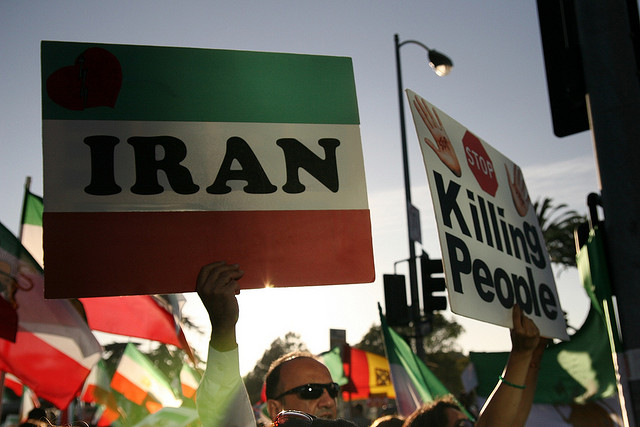Aram Ghoogasian: Protesters must review past US actions before labeling Iran as evil

A rally outside Westwood federal building in July 2009 protested the outcome of Iranian elections. (Creative Commons photo by Christopher Soltis via Flickr)
By Aram Ghoogasian
Aug. 3, 2015 7:52 a.m.
Protests against the actions of the United States government aren’t uncommon in times of war. But last week, diplomacy was the source of outrage.
A crowd of hundreds of people assembled outside the federal building in Westwood to protest the nuclear deal recently signed between Iran, China, Russia, the United Kingdom, France, the United States, Germany and a European Union representative. The rally included a brief speech from the Iranian-American star of the reality show “Shahs of Sunset” Reza Farahan.
Many protesters questioned why the U.S. should engage Iran, the state that Farahan called the “worst country on the planet” and whose people he labeled the “most evil people on the planet,” remarks that drew sizable cheers from the crowd. After all, Americans do have the most unfavorable perception of Iran in the world, according to a poll conducted by the BBC in 2013.
People like the protesters buy into the idea that Iran is a rogue state whose anti-American sentiments exist in a vacuum. But, like most political phenomena, it can’t be viewed in isolation. Their platitudinous slogans and vitriolic speeches are symptoms of myopia.
Much of these attitudes have been around for nearly 40 years. In November 1979, the same year the Iranian Revolution ended in the overthrow of the Pahlavi dynasty supported by the U.S., a group of students stormed the U.S. Embassy in Tehran and took dozens of Americans hostage, holding them for more than a year. American distrust of Iran and, by extension, Iranians, largely stems from this incident.
The hostage crisis wasn’t the beginning of the rift between the U.S. and Iran nor was it the only major turning point. Viewing 1979 as the sole focal point is fallacious and ignores a trend of injustices the United States has committed against the Iranian people on Iranian soil.
To put the current state of the relations between the U.S. and Iran in context, anti-Iran protesters would do well to look toward 1953, a quarter-century before Mohammad Reza Pahlavi was deposed.
Iran’s democratically elected prime minister, Mohammad Mosaddegh, was overthrown in a coup orchestrated by the CIA that year. The backing he received from the communist Tudeh party and his plan to nationalize the oil industry, which was heavily exploited by a British oil company at the time, made him a target. The coup helped foster strong opposition to U.S. policy among Iranians.
The U.S. then helped reinstall the despotic shah, or monarch, as the head of state. After he was dethroned in 1979, he fled to the States to receive cancer treatment. The U.S.’s refusal to extradite him to Iran, along with its decades-long support of the regime, led to the hostage crisis.
In the 1980s, the U.S. illegally armed Iraq during the Iran-Iraq War. During the same war, the Reagan administration, held in high regard by many opponents of relations with Iran, facilitated the illegal sale of arms to Iran as well, an episode known as the Iran-Contra scandal. Arming Iran through Israel was meant to secure the release of hostages in Lebanon, but it worked to add fuel to a long and catastrophic war.
The laundry list doesn’t end there. Just before the end of the war in 1988, an American missile cruiser shot an Iranian commercial airliner out of the sky over the Strait of Hormuz, killing 290. The U.S. only compensated the victim’s families and expressed “deep regret” eight years later, falling just short of an apology.
Today, many Americans cite Iran’s support of Hezbollah and, until recently, Hamas, both of which are considered terrorist organizations by the U.S., as a reason to not trust the country. They either willfully ignore or are ignorant of the U.S. and Israeli governments’ connections with Jundallah, a militant organization that carries out attacks in Iran. Ironically, the U.S. considers Jundallah a terrorist organization as well.
By ignoring this history, opponents of any sort of relationship with Iran can easily push the narrative that Iran is evil and shouldn’t be engaged diplomatically, no matter the stakes. The situation, however, demands diplomacy.
The success of the deal will be a victory for nonproliferation and the well-being of Iran’s 77 million citizens. Its failure, on the other hand, could possibly trigger an arms race in a region that is already in turmoil.
If the protesters want to argue against the deal and make claims about Iran and Iranians, they should first spend more time reading history books and less time cheering on a D-list reality television star with no background in diplomacy or nuclear physics. Otherwise their message does little more than promote ignorance and hatred.


